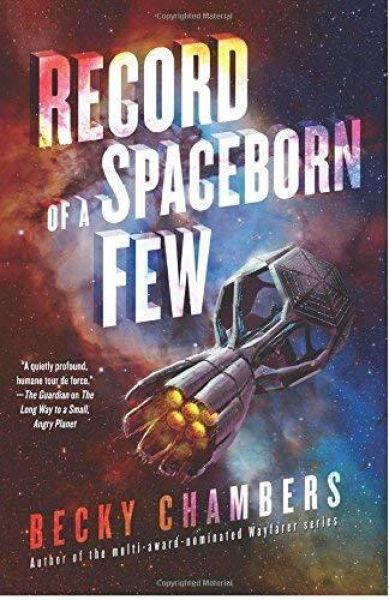‘Tis The Gift To Be Simple
Record of a Spaceborn Few (Galactic Commons, volume 3)
By Becky Chambers

3 Jul, 2018
2018’s Record of a Spaceborn Few is the third volume in Becky Chambers’ Galactic Commons series.
Having ruined the Earth, humans mined the Earth’s cities and turned them into a vast interstellar fleet. The Exodus Fleet’s design proved surprisingly robust; not only did the fleet survive centuries and light-years, the people riding the ships neither went mad nor devolved into cannibalistic barbarians. The Exodus Fleet was an impressive achievement. Even if the technology involved was hilariously backward by galactic standards.
If only humans had encountered the galaxy-spanning Galactic Commons (GC) before the Fleet set out, the whole endeavour might have been unnecessary. As it is, the human race was allowed to join the GC as a very junior member, while the aging Fleet was graciously permitted to park itself in an otherwise useless stellar system.
Where it still orbits.
Time is not on the Fleet’s side. Inherently limited by its nature, the Fleet cannot offer young people the economic opportunities the GC can. Many young people, given the choice between
A: living a virtuous but poor life in an environment that requires constant maintenance, or
B: comparative prosperity as second or third class citizens out-system
choose the latter.
If the demographic drain were not bad enough, the ships are reaching an age where even unending meticulous maintenance cannot keep them viable. The mishap that destroyed the Oxomoco and killed almost 44,000 Exodans may be a harbinger of the future that awaits all the ships of the Fleet.
Sawyer is an exception, he comes from a planet-bound human community, but he is drawn to the Fleet by curiosity about its unusual culture. He joins the community, which receives him with something less than enthusiasm. The naive recruit is left to fumble for a viable niche as best he can. It’s a situation that leaves him vulnerable and exploitable.
~oOo~
Sweet zombie Jesus, I think Chambers’ rocket science is actually getting worse. And this is a series where ships are somehow powered by algae!
When the Exodans first left Earth, they burned chemical fuels to get going, just to tide them over until enough kinetic energy had been generated through the floors.
I could also quibble about whether strip-mining the Earth to build a fleet of generation ships was really the best way to deal with declining planetary conditions. After all, any life-support system that can keep thousands of people alive in deep space should be able to do the same on Earth, and do so for many more humans than the few who made it onto the fleet. But … there’s enough wiggle room in the backstory1 that I can imagine that the Fleet was just a stupid idea that managed to make it to reality. We can all think of real world examples.
But the book isn’t about rocket science or bad decisions in the distant past. It’s about the consequences of deciding to live in small, artificial habitats. It’s about one culture’s solutions to the inherent challenges. For example, the Exodans have to be far more aware of human and material lifecycles than the planet-bound. Nothing happens on the fleet unless someone chooses it and makes it happen. When 44,000 people die, for example, that means difficult choices have to be made about whose remains get cycled into the life support systems and when. The composting systems aren’t set up to deal with that much material all at once.
The Fleet is so tiny that barter is sufficient to maintain a viable economy. It is sufficiently small-town that moral suasion is really all that is needed to motivate hard work and cooperation. Of course knowing that that the alternative to community is certain death in the cold vacuum of interstellar space probably keeps Exodans on the straight and narrow..
The galaxy as a whole has a familiar capitalist-style economy; money, rentiers, ginormous Gini coefficients, and poverty. While it cannot… sorry, chooses not to … offer its people the security (food, housing, medical care) that the fleet offers its citizens, the galactic economy is vast. It offers niches, experiences, and benefits that the fleet cannot.
These settings (Fleet, GC) have consequences for the characters. Parents worry that their values will be lost and forgotten as their kids migrate to alien worlds. Teens chafe against rules that seem silly in the context of the GC. A few idealists are drawn to the Fleet’s promise of community and security. The Fleet’s low-key xenophobia means that people like Sawyer are left to twist in the wind. Politics and economics affect the characters; the characters make these higher-level systems matter.
The book hopscotches between situations and characters. I was worried that this book might turn out to be nothing more than a collection of loosely related anecdotes. Not the case. All the plot threads turn out to be interconnected, tied together by a stranger from far away. I suppose I should have expected that from the author’s interest in interlocking systems.
Implausibility of the Fleet setting aside, this was a good read. I liked the characters and wanted them to have happy endings. Recommended.
Record of a Spaceborn Few is available here (Amazon) and here (Chapters-Indigo).
1: For one thing, there are people living on Earth so it cannot have been ruined to the point of uninhabitability. However, having all the cities strip-mined probably didn’t help the remainers deal with a ravaged Earth.
